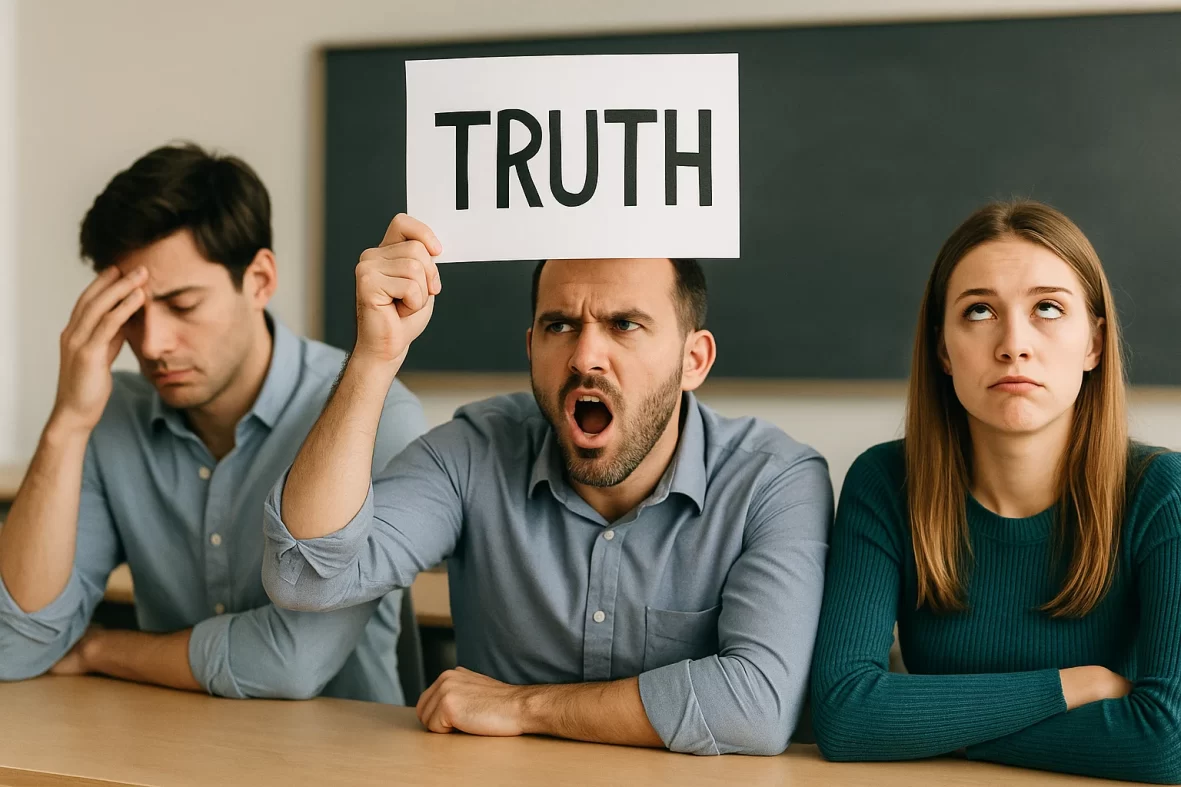Truth Matters, Part 1: A Response to Katherine Maher’s TED Talk
Truth: The Roadblock to Progress? Or the Road Itself?
“Our reverence for the truth might be a distraction.”
– Katherine Maher, 2021 TED Talk
Well, that’s one way to open a conversation.
In her TED Talk, Katherine Maher—former head of the Wikimedia Foundation and a professional optimist about the internet—drops this zinger: Maybe truth is the problem. Not lies. Not confusion. Not the TikTokification of reality. Nope, it’s our reverence for the truth that’s holding us back. Because, she argues, truth might be getting in the way of consensus.
And look, we get the appeal. In an age of comment-section brawls and Wikipedia edit wars, truth can feel more like a buzzkill than a blessing. Maher wants peace. Dialogue. Progress. She’s tired of every conversation turning into a debate club final round. Fair enough.
But here’s the catch: if truth is just a roadblock to cooperation, we might need to ask—cooperation toward what?
Because if we agree to call a fire hydrant a popsicle just to get along… someone’s going to have a really bad day.
Maher’s Claim: Truth Gets in the Way of Getting Things Done
Maher observes that the insistence on being “right” often causes gridlock. She notes that even on Wikipedia—arguably the best collaborative encyclopedia written by unpaid strangers with strong opinions—people had to dial back their personal truths to work together. Her conclusion? Sometimes, truth is less important than just getting something done.
That’s not insane. It’s actually pretty understandable. Collaboration requires tact, patience, and the ability to not correct every wrong thing your uncle says at Thanksgiving.
But it’s also a dangerous slope.
Because if we decide that truth is optional—a “distraction”—then all we’ve got left is a tug-of-war between perspectives. And in a tug-of-war, the loudest side usually wins. Not the wisest.
C.S. Lewis, never one to pull punches, saw this coming:
“If you look for truth, you may find comfort in the end; if you look for comfort, you will not get either comfort or truth…only soft soap and wishful thinking.”
(Mere Christianity, 1952, p. 179)
Translation: chasing agreement without truth leads to a comforting illusion—and eventually a rude awakening.
A Biblical View: Truth Isn’t a Distraction. It’s the Destination.
Enter Scripture. Jesus didn’t say, “I am the suggestion, the vibe, and the preferred narrative.”
He said, “I am the way, and the truth, and the life.” (John 14:6)
In fact, He came to “testify to the truth” (John 18:37). The very next verse? Pilate shrugs and says, “What is truth?”
Congratulations, Rome. You invented postmodernism 2,000 years early.
The Bible is unapologetically pro-truth. God’s Word is truth (John 17:17). His people are to be “pillars and supports of the truth” (1 Timothy 3:15). This isn’t just about religious doctrine. It’s about how we understand reality.
As theologian Wayne Grudem put it:
“All His knowledge and words are both true and the final standard of truth.”
(Systematic Theology, 1994, p. 195)
If God defines truth, then truth isn’t negotiable. It’s not the seasoning we sprinkle on top of consensus—it’s the foundation we build anything meaningful on.
Truth and Love: Not Enemies. Soulmates.
Maher worries truth gets in the way of love. But Scripture says otherwise.
- “Love rejoices in the truth” (1 Corinthians 13:6)
- “Speak the truth in love” (Ephesians 4:15)
John MacArthur nails the balance:
“Truth without love is brutality. Love without truth is hypocrisy.”
(The Truth War, 2002)
If we abandon truth to keep the peace, we don’t get love—we get niceness. And niceness is what you offer someone at a dinner party. Not what you build a just society on.
Truth Is the Bedrock of Justice
Isaiah had some thoughts on truthlessness:
“Truth has stumbled in the street… and uprightness cannot enter” (Isaiah 59:14)
In other words, when truth collapses, justice goes with it. Call it whatever you want—progress, inclusion, moral innovation—but if it’s built on fiction, it’s already falling apart.
Chuck Colson was blunt:
“A righteous cause has no meaning apart from its being rooted in absolute truth.”
(How Now Shall We Live?, 1999)
Try building justice on vibes and watch how quickly injustice sneaks in wearing a smiley-face pin.
The Bottom Line: Truth Is What Unites, Not What Divides
Katherine Maher wants collaboration. So do we. But unity without truth isn’t unity—it’s groupthink.
Jesus prayed we’d be “perfected in unity” (John 17:23)—and that unity is anchored in truth, not detoured around it.
Let’s not pretend truth is optional just because it makes the dinner table awkward or the group chat spicy. Real peace doesn’t come from silence or spin. It comes from people committed to reality, lovingly lived out.
As Lewis warned, you can’t demand the fruit of virtue without planting the tree of truth.
So yes, Katherine, truth can make things harder. It can slow the process. It can stir the pot.
But it’s also the only path to love, justice, unity—and anything worth building.
Next Up in the Series:
Can we build a shared reality on the bare minimum—or does that just give us minimum truth and maximum confusion?
Stay tuned.








